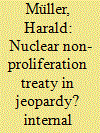| Srl | Item |
| 1 |
ID:
172901


|
|
|
|
|
| Summary/Abstract |
The 2017 Treaty on the Prohibition of Nuclear Weapons (tpnw) represents a daring act of self-empowerment: nuclear have-nots produced an international disarmament treaty without the involvement of the nuclear-weapon states or their allies. In this essay, we assess how the new treaty relates to the existing nuclear order and its four central norms: constraints on use, political restraint, non-proliferation, and disarmament. We discuss the tpnw's origin in and impact on this contested order. At the heart of contestation are two security concepts: deterrence versus the immediate ban of nuclear arms, which result in fundamentally different ideas on how to pursue the road to “global zero.” Whether or not the tpnw and the Treaty on the Non-Proliferation of Nuclear Weapons are compatible depends on how the opponents handle their controversies. The key is to overcome the emotionalized polarization and rediscover a common basis in order to prevent damage to the existing nuclear order and bring forward nuclear disarmament in practice.
|
|
|
|
|
|
|
|
|
|
|
|
|
|
|
|
| 2 |
ID:
152540


|
|
|
|
|
| Summary/Abstract |
The frustration of non-nuclear weapon states about the lack of progress in nuclear disarmament has reached boiling point: a vast majority of them have supported a resolution in the UN General Assembly that establishes a negotiation forum for concluding a prohibition of nuclear weapons in 2017. Rising tension among the nuclear powers and populist movements feeding nationalist emotions make it unlikely that the situation will change for the better in the near future. It is thus possible that the NPT might be eroded or, in the worst case scenario, simply collapse because of diminishing support.
|
|
|
|
|
|
|
|
|
|
|
|
|
|
|
|
| 3 |
ID:
158998


|
|
|
|
|
| Summary/Abstract |
Was the 1998 Pokhran test a historical watershed as many contemporary observers believed? This article looks at its impact on the nuclear non-proliferation regime, regional security, India’s position in global institutions, and the ongoing global power shift: the non-proliferation regime continued along the old dispute lines; regional conflict behaviour did not change at all; India grew into global institutions not because of nuclear tests but because of her remarkable economic development; the re-arrangement of global power follows more basic trends as well. The only tangible effect of the Pokhran test was to change India’s exposition to nuclear blackmail from improbable to impossible, not unimportant but still marginal.
|
|
|
|
|
|
|
|
|
|
|
|
|
|
|
|